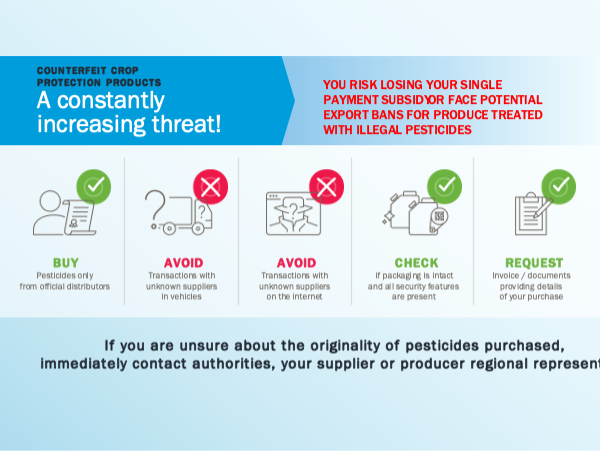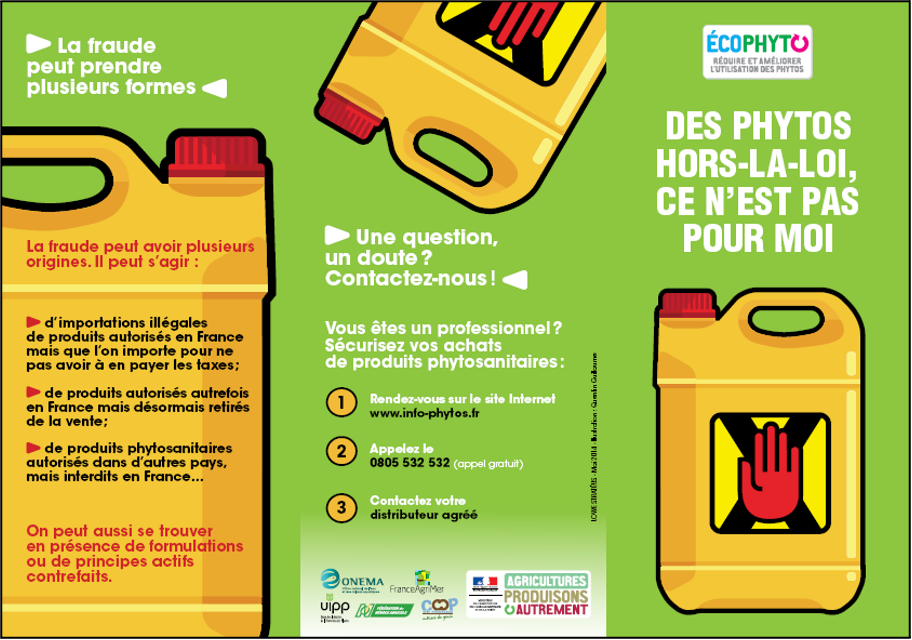Counterfeit and illegal pesticides are a danger to farmers health, their crops and the environment. Therefore, as the crop protection industry, we are strongly involved in stopping these illicit pesticides from entering Europe and being applied to crops. Our network consists of member companies and country associations and we also work closely with our regional and global organisations.

1. Raising awareness on illegal pesticides
One of our most important goals is to help protect farmers from buying counterfeit or illegal pesticides. Farmers can be defrauded by criminals offering counterfeit/illegal pesticides through a variety of different channels. We run a number of campaigns dedicated to farming communities to warn them about risks associated with buying counterfeit or illegal pesticides and to show them how to purchase authentic, registered pesticides. We have built dedicated websites to support farmers in Poland, Greece, Lithuania and Bulgaria. Our members are also reaching farmers with social and printed media. We have developed communications tools such as videos (including animations), posters, leaflets in all EU languages. We are also active in countries outside the EU, for example in United Kingdom, Russia, Serbia and Turkey,. Each year, our network conducts trainings for more than 50 000 farmers across the European Union. In some countries, for example in Italy, Spain and Greece we run toll free information lines where information can reported anonymously about suspicious distribution or use of counterfeit/illegal products. We also cooperate with all stakeholders in the food chain, such as farmer organisations, producers, suppliers and retailers. A very important learning from our years of anti-counterfeit activity is that cooperation and active participation by industry and public authorities is key to the success of communication and awareness campaigns.

2. Cooperation with law enforcement and food safety authorities
The fight against counterfeit/illegal pesticides is a fully collaborative effort with all legitimate stakeholders involved. Each stakeholder brings resources, expertise and contributions where it is needed, making the whole process as effective as possible. That is why we organise seminars for police, customs, and food safety authorities to help them to identify counterfeit products and exchange best practices. The results of cooperation on the EU level can bring results such as those produced in operation Silver Axe. It is a Europol coordinated action targeting counterfeit and illegal pesticides. The joint effort involves authorities from 35 countries, European Union Intellectual Property Office (EUIPO), the European Anti-Fraud Office (OLAF) and European Commission`s DG Sante as well as Crop Life Europe. Our network provides technical knowledge as well as sharing intelligence. This year’s edition, Silver Axe VI,resulted in 12 arrests and seizure of 1,203 tons of illegal/counterfeit pesticides.
3. Closing legislative loopholes
The Third pillar of our strategy against counterfeit and illegal pesticides is improving legislation at EU and national levels to make work of responsible law enforcement authorities easier. To achieve this aim, our national associations are working with local authorities and policy makers and CropLife Europe secretariat based in Brussels are involved in dialogue with European Parliament, Council and European Commission.
CropLife Europe wish list to stop counterfeit/illegal pesticides:
- Increase effectiveness and impact of awareness raising (to farmers and other food chain stakeholders) about the issue through partnerships formed by cooperation and active participation by industry and public authorities
- empowerment of customs officials to be able to stop products “in transit” based on false and/or incomplete documentation or strong suspicion of potential for illegal placement on the EU market, providing the needed time for product testing
- appropriate punishment for distribution and sale of counterfeit and illegal pesticides has to be taken to create deterrence to criminals and fake or illegal products need to be destroyed safely to prevent market re-entry and associated health and environmental risks
- operational working partnerships between customs and pesticide authorities to detect and prevent entry of illegal pesticides in ports and at land borders is needed; utilising and coordinating information on patterns of illegal pesticides across EU countries to further minimise entry of illegal pesticides.
- development of a shared digital platform permitting trans-European cooperation by enforcement authorities (customs, pesticide authorities and police) for sharing and receiving intelligence directly from supply chain intermediaries and industry about suspicious shipments.